Career Opportunities in the Australian Hospitality Industry: Chef
VerifiedAdded on 2023/06/08
|16
|3296
|296
Report
AI Summary
This report analyzes career opportunities for a chef in the Australian hospitality industry. It begins with an introduction to a chef's career, followed by the student's personal career expectations, starting as a commis chef and progressing to a food and beverage director. The report then compares these expectations with relevant literature, explores the SMART goal theory for setting career objectives, and concludes with a summary of the discussed points. The report also includes a database of potential employers in Melbourne, along with their contact information and website links. It emphasizes the importance of gaining experience and skills to advance in the industry, with a focus on both linear and spiral career concepts, and the application of the SODI model for career planning and decision-making. The report highlights the flexibility and boundary-less nature of a chef's career, especially for experienced professionals. The report uses academic references to support its points and to establish a foundation for the author's career goals and plans after graduation.
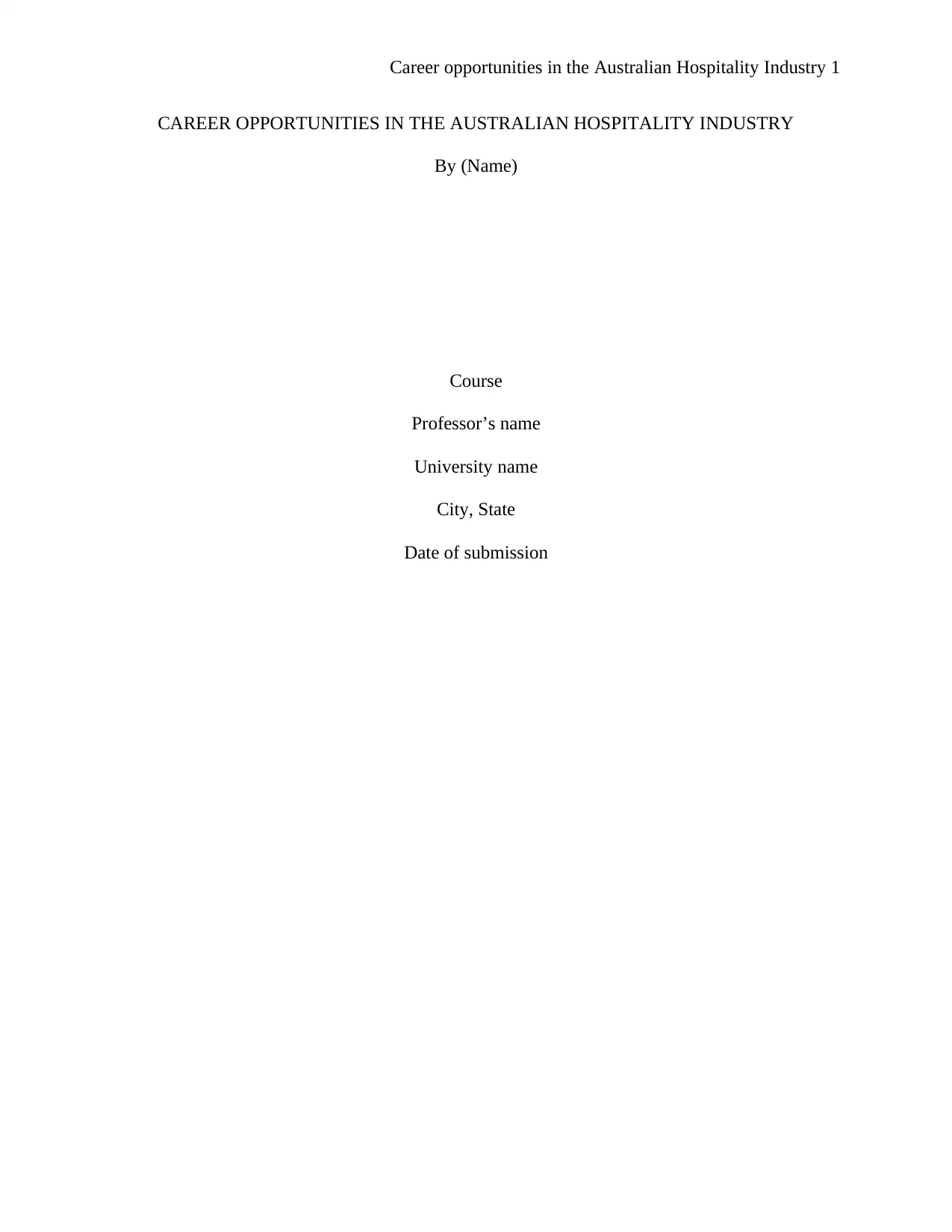
Career opportunities in the Australian Hospitality Industry 1
CAREER OPPORTUNITIES IN THE AUSTRALIAN HOSPITALITY INDUSTRY
By (Name)
Course
Professor’s name
University name
City, State
Date of submission
CAREER OPPORTUNITIES IN THE AUSTRALIAN HOSPITALITY INDUSTRY
By (Name)
Course
Professor’s name
University name
City, State
Date of submission
Paraphrase This Document
Need a fresh take? Get an instant paraphrase of this document with our AI Paraphraser
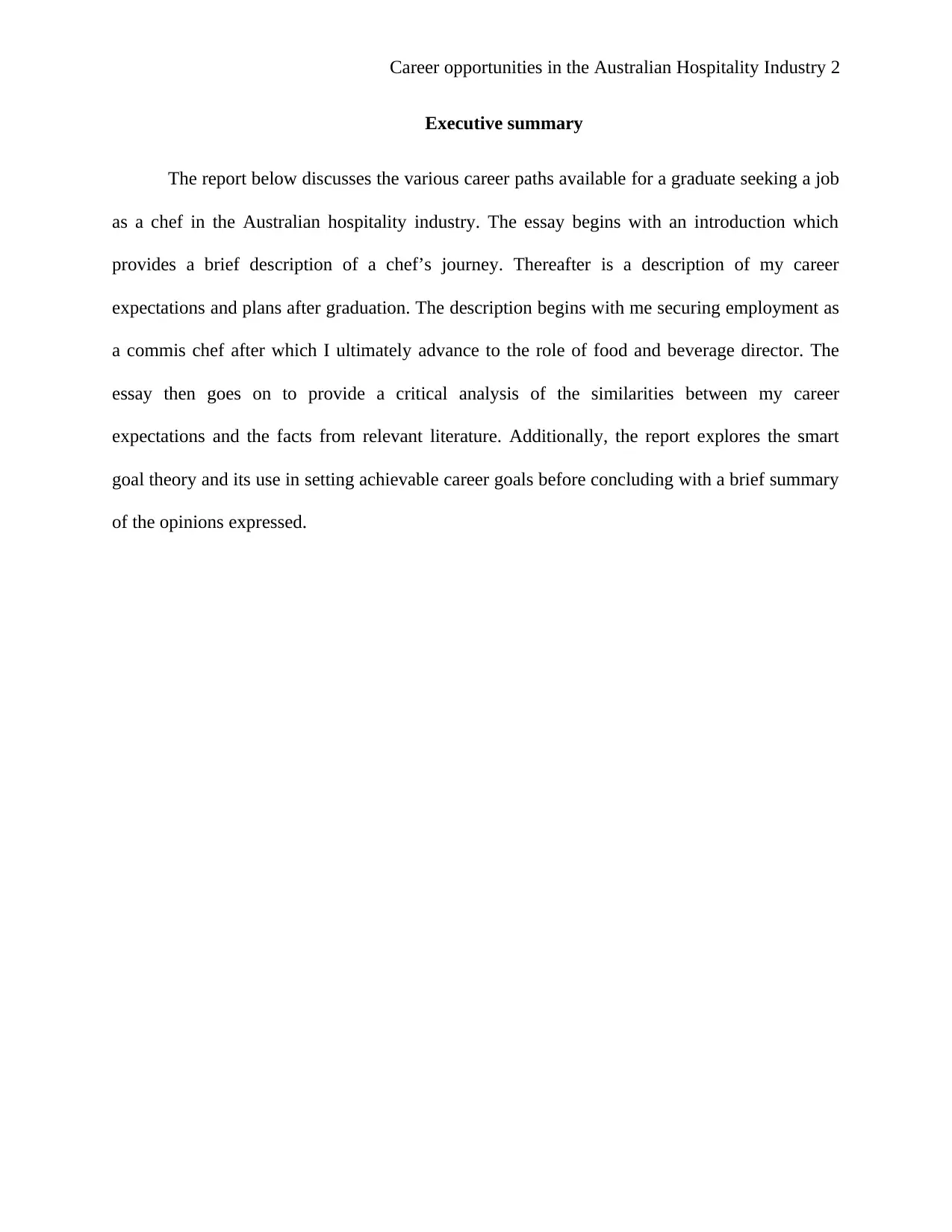
Career opportunities in the Australian Hospitality Industry 2
Executive summary
The report below discusses the various career paths available for a graduate seeking a job
as a chef in the Australian hospitality industry. The essay begins with an introduction which
provides a brief description of a chef’s journey. Thereafter is a description of my career
expectations and plans after graduation. The description begins with me securing employment as
a commis chef after which I ultimately advance to the role of food and beverage director. The
essay then goes on to provide a critical analysis of the similarities between my career
expectations and the facts from relevant literature. Additionally, the report explores the smart
goal theory and its use in setting achievable career goals before concluding with a brief summary
of the opinions expressed.
Executive summary
The report below discusses the various career paths available for a graduate seeking a job
as a chef in the Australian hospitality industry. The essay begins with an introduction which
provides a brief description of a chef’s journey. Thereafter is a description of my career
expectations and plans after graduation. The description begins with me securing employment as
a commis chef after which I ultimately advance to the role of food and beverage director. The
essay then goes on to provide a critical analysis of the similarities between my career
expectations and the facts from relevant literature. Additionally, the report explores the smart
goal theory and its use in setting achievable career goals before concluding with a brief summary
of the opinions expressed.
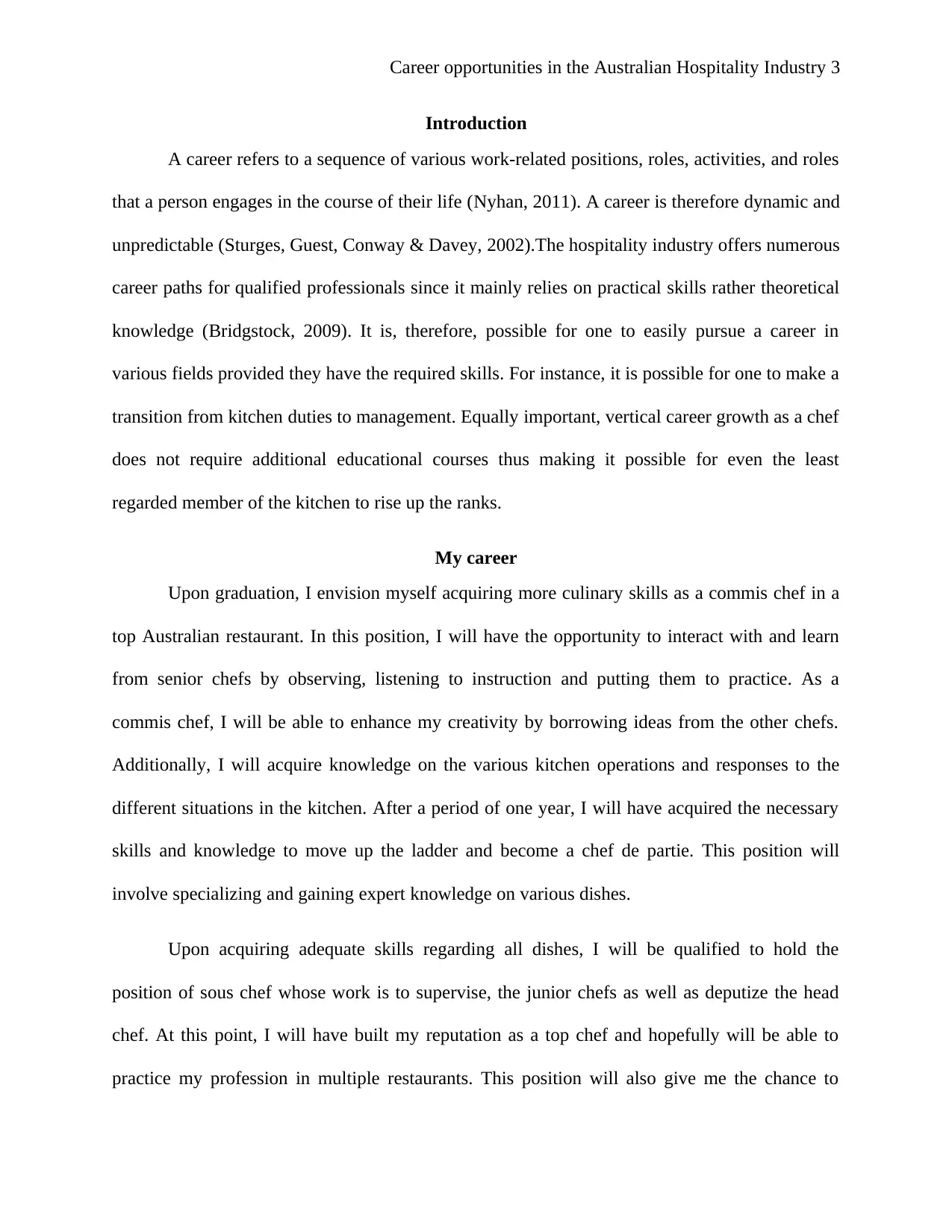
Career opportunities in the Australian Hospitality Industry 3
Introduction
A career refers to a sequence of various work-related positions, roles, activities, and roles
that a person engages in the course of their life (Nyhan, 2011). A career is therefore dynamic and
unpredictable (Sturges, Guest, Conway & Davey, 2002).The hospitality industry offers numerous
career paths for qualified professionals since it mainly relies on practical skills rather theoretical
knowledge (Bridgstock, 2009). It is, therefore, possible for one to easily pursue a career in
various fields provided they have the required skills. For instance, it is possible for one to make a
transition from kitchen duties to management. Equally important, vertical career growth as a chef
does not require additional educational courses thus making it possible for even the least
regarded member of the kitchen to rise up the ranks.
My career
Upon graduation, I envision myself acquiring more culinary skills as a commis chef in a
top Australian restaurant. In this position, I will have the opportunity to interact with and learn
from senior chefs by observing, listening to instruction and putting them to practice. As a
commis chef, I will be able to enhance my creativity by borrowing ideas from the other chefs.
Additionally, I will acquire knowledge on the various kitchen operations and responses to the
different situations in the kitchen. After a period of one year, I will have acquired the necessary
skills and knowledge to move up the ladder and become a chef de partie. This position will
involve specializing and gaining expert knowledge on various dishes.
Upon acquiring adequate skills regarding all dishes, I will be qualified to hold the
position of sous chef whose work is to supervise, the junior chefs as well as deputize the head
chef. At this point, I will have built my reputation as a top chef and hopefully will be able to
practice my profession in multiple restaurants. This position will also give me the chance to
Introduction
A career refers to a sequence of various work-related positions, roles, activities, and roles
that a person engages in the course of their life (Nyhan, 2011). A career is therefore dynamic and
unpredictable (Sturges, Guest, Conway & Davey, 2002).The hospitality industry offers numerous
career paths for qualified professionals since it mainly relies on practical skills rather theoretical
knowledge (Bridgstock, 2009). It is, therefore, possible for one to easily pursue a career in
various fields provided they have the required skills. For instance, it is possible for one to make a
transition from kitchen duties to management. Equally important, vertical career growth as a chef
does not require additional educational courses thus making it possible for even the least
regarded member of the kitchen to rise up the ranks.
My career
Upon graduation, I envision myself acquiring more culinary skills as a commis chef in a
top Australian restaurant. In this position, I will have the opportunity to interact with and learn
from senior chefs by observing, listening to instruction and putting them to practice. As a
commis chef, I will be able to enhance my creativity by borrowing ideas from the other chefs.
Additionally, I will acquire knowledge on the various kitchen operations and responses to the
different situations in the kitchen. After a period of one year, I will have acquired the necessary
skills and knowledge to move up the ladder and become a chef de partie. This position will
involve specializing and gaining expert knowledge on various dishes.
Upon acquiring adequate skills regarding all dishes, I will be qualified to hold the
position of sous chef whose work is to supervise, the junior chefs as well as deputize the head
chef. At this point, I will have built my reputation as a top chef and hopefully will be able to
practice my profession in multiple restaurants. This position will also give me the chance to
⊘ This is a preview!⊘
Do you want full access?
Subscribe today to unlock all pages.

Trusted by 1+ million students worldwide
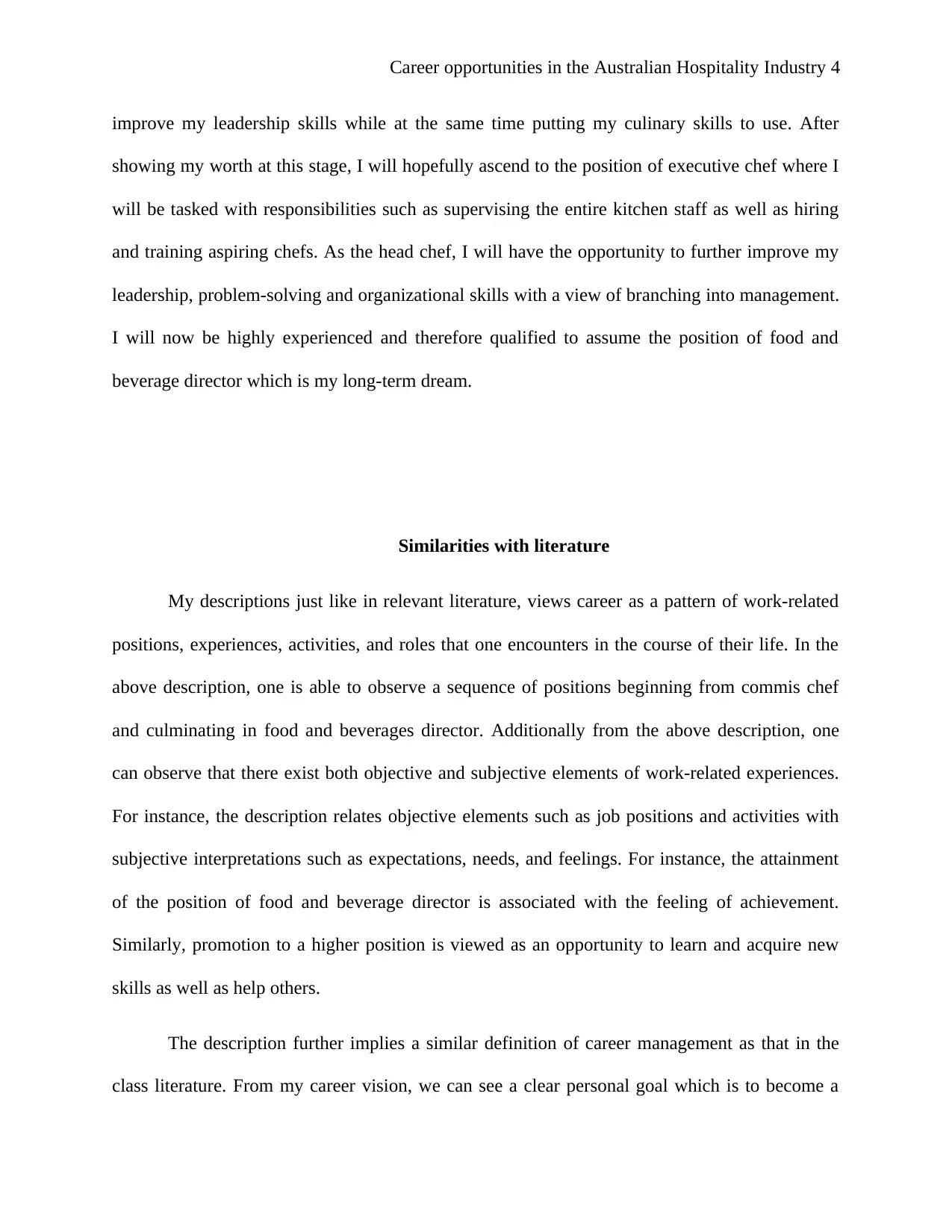
Career opportunities in the Australian Hospitality Industry 4
improve my leadership skills while at the same time putting my culinary skills to use. After
showing my worth at this stage, I will hopefully ascend to the position of executive chef where I
will be tasked with responsibilities such as supervising the entire kitchen staff as well as hiring
and training aspiring chefs. As the head chef, I will have the opportunity to further improve my
leadership, problem-solving and organizational skills with a view of branching into management.
I will now be highly experienced and therefore qualified to assume the position of food and
beverage director which is my long-term dream.
Similarities with literature
My descriptions just like in relevant literature, views career as a pattern of work-related
positions, experiences, activities, and roles that one encounters in the course of their life. In the
above description, one is able to observe a sequence of positions beginning from commis chef
and culminating in food and beverages director. Additionally from the above description, one
can observe that there exist both objective and subjective elements of work-related experiences.
For instance, the description relates objective elements such as job positions and activities with
subjective interpretations such as expectations, needs, and feelings. For instance, the attainment
of the position of food and beverage director is associated with the feeling of achievement.
Similarly, promotion to a higher position is viewed as an opportunity to learn and acquire new
skills as well as help others.
The description further implies a similar definition of career management as that in the
class literature. From my career vision, we can see a clear personal goal which is to become a
improve my leadership skills while at the same time putting my culinary skills to use. After
showing my worth at this stage, I will hopefully ascend to the position of executive chef where I
will be tasked with responsibilities such as supervising the entire kitchen staff as well as hiring
and training aspiring chefs. As the head chef, I will have the opportunity to further improve my
leadership, problem-solving and organizational skills with a view of branching into management.
I will now be highly experienced and therefore qualified to assume the position of food and
beverage director which is my long-term dream.
Similarities with literature
My descriptions just like in relevant literature, views career as a pattern of work-related
positions, experiences, activities, and roles that one encounters in the course of their life. In the
above description, one is able to observe a sequence of positions beginning from commis chef
and culminating in food and beverages director. Additionally from the above description, one
can observe that there exist both objective and subjective elements of work-related experiences.
For instance, the description relates objective elements such as job positions and activities with
subjective interpretations such as expectations, needs, and feelings. For instance, the attainment
of the position of food and beverage director is associated with the feeling of achievement.
Similarly, promotion to a higher position is viewed as an opportunity to learn and acquire new
skills as well as help others.
The description further implies a similar definition of career management as that in the
class literature. From my career vision, we can see a clear personal goal which is to become a
Paraphrase This Document
Need a fresh take? Get an instant paraphrase of this document with our AI Paraphraser
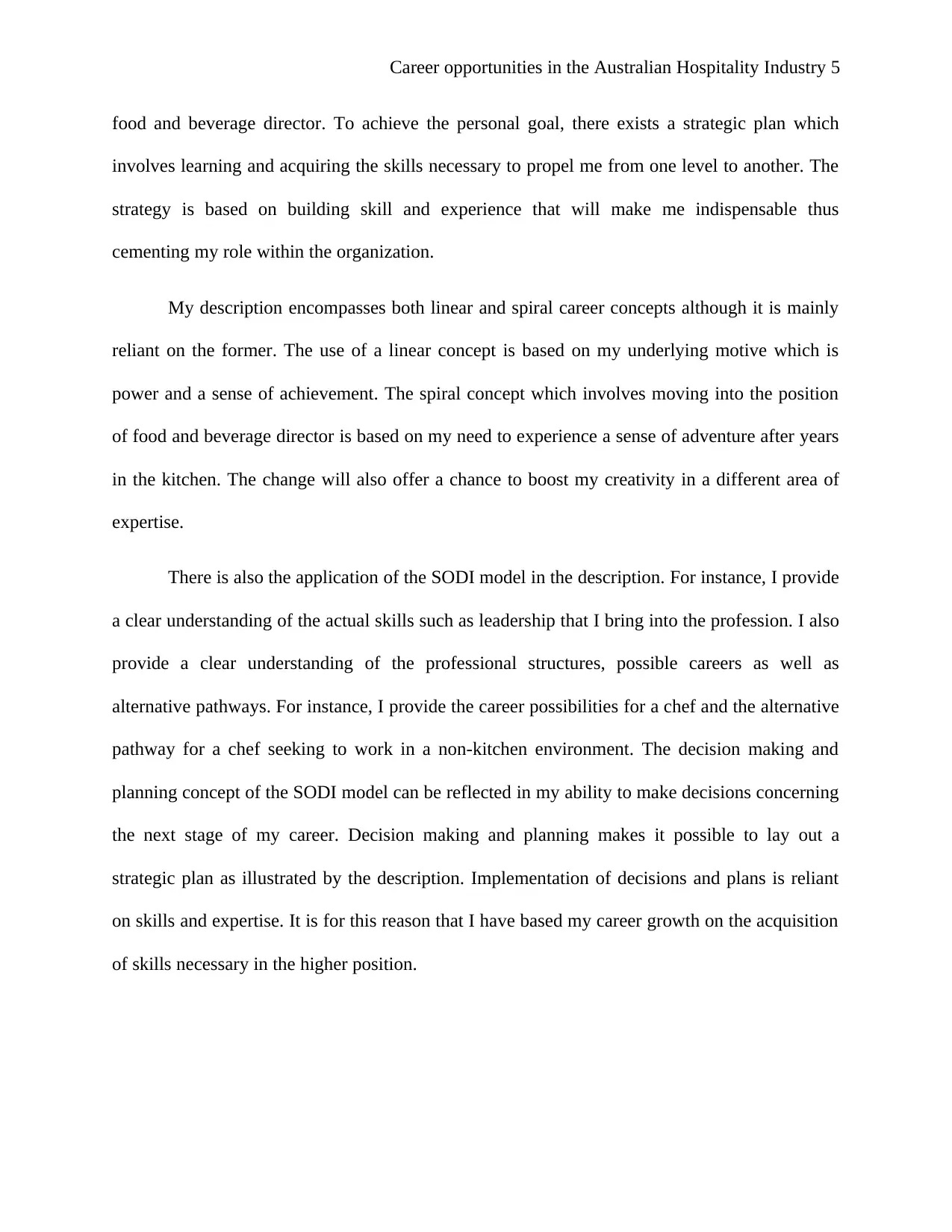
Career opportunities in the Australian Hospitality Industry 5
food and beverage director. To achieve the personal goal, there exists a strategic plan which
involves learning and acquiring the skills necessary to propel me from one level to another. The
strategy is based on building skill and experience that will make me indispensable thus
cementing my role within the organization.
My description encompasses both linear and spiral career concepts although it is mainly
reliant on the former. The use of a linear concept is based on my underlying motive which is
power and a sense of achievement. The spiral concept which involves moving into the position
of food and beverage director is based on my need to experience a sense of adventure after years
in the kitchen. The change will also offer a chance to boost my creativity in a different area of
expertise.
There is also the application of the SODI model in the description. For instance, I provide
a clear understanding of the actual skills such as leadership that I bring into the profession. I also
provide a clear understanding of the professional structures, possible careers as well as
alternative pathways. For instance, I provide the career possibilities for a chef and the alternative
pathway for a chef seeking to work in a non-kitchen environment. The decision making and
planning concept of the SODI model can be reflected in my ability to make decisions concerning
the next stage of my career. Decision making and planning makes it possible to lay out a
strategic plan as illustrated by the description. Implementation of decisions and plans is reliant
on skills and expertise. It is for this reason that I have based my career growth on the acquisition
of skills necessary in the higher position.
food and beverage director. To achieve the personal goal, there exists a strategic plan which
involves learning and acquiring the skills necessary to propel me from one level to another. The
strategy is based on building skill and experience that will make me indispensable thus
cementing my role within the organization.
My description encompasses both linear and spiral career concepts although it is mainly
reliant on the former. The use of a linear concept is based on my underlying motive which is
power and a sense of achievement. The spiral concept which involves moving into the position
of food and beverage director is based on my need to experience a sense of adventure after years
in the kitchen. The change will also offer a chance to boost my creativity in a different area of
expertise.
There is also the application of the SODI model in the description. For instance, I provide
a clear understanding of the actual skills such as leadership that I bring into the profession. I also
provide a clear understanding of the professional structures, possible careers as well as
alternative pathways. For instance, I provide the career possibilities for a chef and the alternative
pathway for a chef seeking to work in a non-kitchen environment. The decision making and
planning concept of the SODI model can be reflected in my ability to make decisions concerning
the next stage of my career. Decision making and planning makes it possible to lay out a
strategic plan as illustrated by the description. Implementation of decisions and plans is reliant
on skills and expertise. It is for this reason that I have based my career growth on the acquisition
of skills necessary in the higher position.
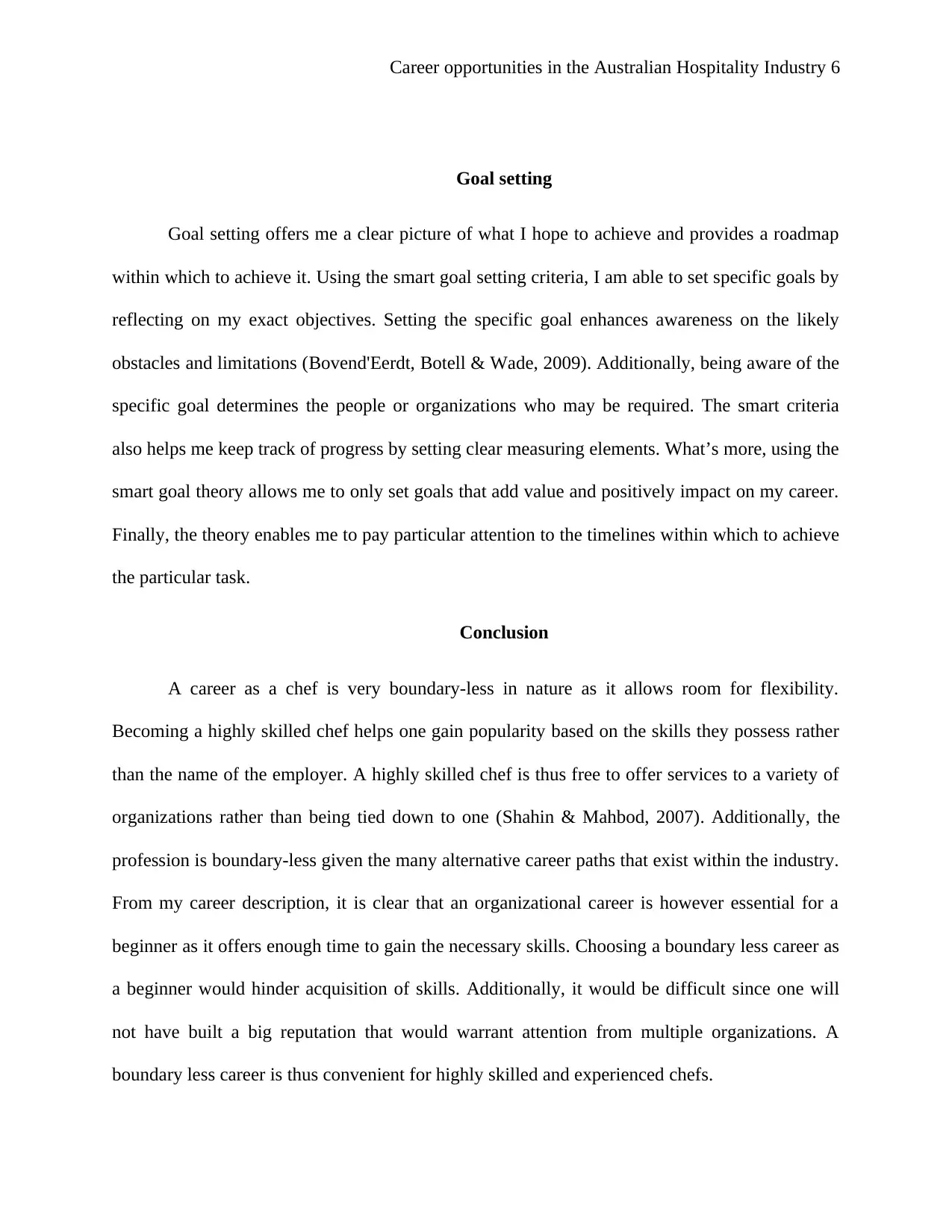
Career opportunities in the Australian Hospitality Industry 6
Goal setting
Goal setting offers me a clear picture of what I hope to achieve and provides a roadmap
within which to achieve it. Using the smart goal setting criteria, I am able to set specific goals by
reflecting on my exact objectives. Setting the specific goal enhances awareness on the likely
obstacles and limitations (Bovend'Eerdt, Botell & Wade, 2009). Additionally, being aware of the
specific goal determines the people or organizations who may be required. The smart criteria
also helps me keep track of progress by setting clear measuring elements. What’s more, using the
smart goal theory allows me to only set goals that add value and positively impact on my career.
Finally, the theory enables me to pay particular attention to the timelines within which to achieve
the particular task.
Conclusion
A career as a chef is very boundary-less in nature as it allows room for flexibility.
Becoming a highly skilled chef helps one gain popularity based on the skills they possess rather
than the name of the employer. A highly skilled chef is thus free to offer services to a variety of
organizations rather than being tied down to one (Shahin & Mahbod, 2007). Additionally, the
profession is boundary-less given the many alternative career paths that exist within the industry.
From my career description, it is clear that an organizational career is however essential for a
beginner as it offers enough time to gain the necessary skills. Choosing a boundary less career as
a beginner would hinder acquisition of skills. Additionally, it would be difficult since one will
not have built a big reputation that would warrant attention from multiple organizations. A
boundary less career is thus convenient for highly skilled and experienced chefs.
Goal setting
Goal setting offers me a clear picture of what I hope to achieve and provides a roadmap
within which to achieve it. Using the smart goal setting criteria, I am able to set specific goals by
reflecting on my exact objectives. Setting the specific goal enhances awareness on the likely
obstacles and limitations (Bovend'Eerdt, Botell & Wade, 2009). Additionally, being aware of the
specific goal determines the people or organizations who may be required. The smart criteria
also helps me keep track of progress by setting clear measuring elements. What’s more, using the
smart goal theory allows me to only set goals that add value and positively impact on my career.
Finally, the theory enables me to pay particular attention to the timelines within which to achieve
the particular task.
Conclusion
A career as a chef is very boundary-less in nature as it allows room for flexibility.
Becoming a highly skilled chef helps one gain popularity based on the skills they possess rather
than the name of the employer. A highly skilled chef is thus free to offer services to a variety of
organizations rather than being tied down to one (Shahin & Mahbod, 2007). Additionally, the
profession is boundary-less given the many alternative career paths that exist within the industry.
From my career description, it is clear that an organizational career is however essential for a
beginner as it offers enough time to gain the necessary skills. Choosing a boundary less career as
a beginner would hinder acquisition of skills. Additionally, it would be difficult since one will
not have built a big reputation that would warrant attention from multiple organizations. A
boundary less career is thus convenient for highly skilled and experienced chefs.
⊘ This is a preview!⊘
Do you want full access?
Subscribe today to unlock all pages.

Trusted by 1+ million students worldwide

Career opportunities in the Australian Hospitality Industry 7
Paraphrase This Document
Need a fresh take? Get an instant paraphrase of this document with our AI Paraphraser
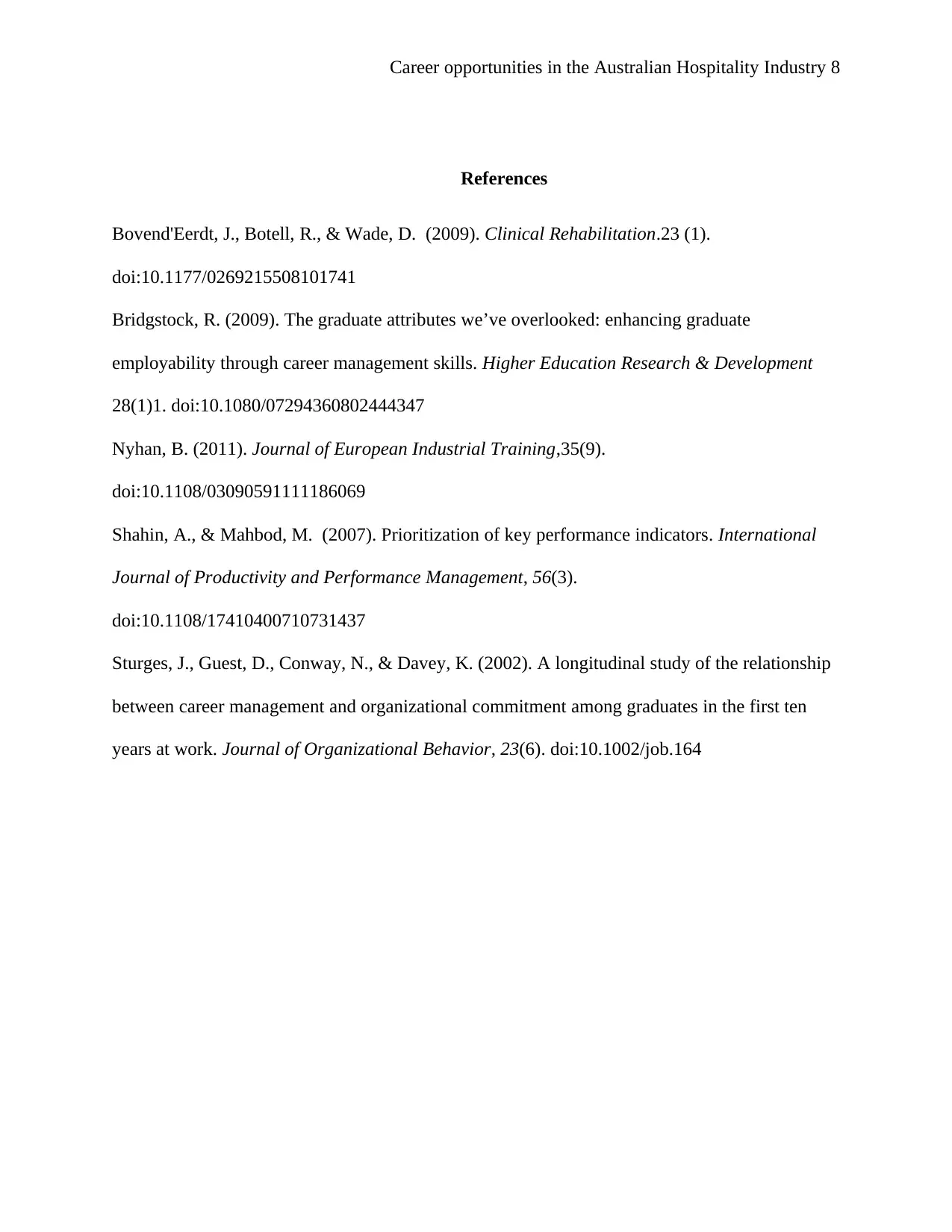
Career opportunities in the Australian Hospitality Industry 8
References
Bovend'Eerdt, J., Botell, R., & Wade, D. (2009). Clinical Rehabilitation.23 (1).
doi:10.1177/0269215508101741
Bridgstock, R. (2009). The graduate attributes we’ve overlooked: enhancing graduate
employability through career management skills. Higher Education Research & Development
28(1)1. doi:10.1080/07294360802444347
Nyhan, B. (2011). Journal of European Industrial Training,35(9).
doi:10.1108/03090591111186069
Shahin, A., & Mahbod, M. (2007). Prioritization of key performance indicators. International
Journal of Productivity and Performance Management, 56(3).
doi:10.1108/17410400710731437
Sturges, J., Guest, D., Conway, N., & Davey, K. (2002). A longitudinal study of the relationship
between career management and organizational commitment among graduates in the first ten
years at work. Journal of Organizational Behavior, 23(6). doi:10.1002/job.164
References
Bovend'Eerdt, J., Botell, R., & Wade, D. (2009). Clinical Rehabilitation.23 (1).
doi:10.1177/0269215508101741
Bridgstock, R. (2009). The graduate attributes we’ve overlooked: enhancing graduate
employability through career management skills. Higher Education Research & Development
28(1)1. doi:10.1080/07294360802444347
Nyhan, B. (2011). Journal of European Industrial Training,35(9).
doi:10.1108/03090591111186069
Shahin, A., & Mahbod, M. (2007). Prioritization of key performance indicators. International
Journal of Productivity and Performance Management, 56(3).
doi:10.1108/17410400710731437
Sturges, J., Guest, D., Conway, N., & Davey, K. (2002). A longitudinal study of the relationship
between career management and organizational commitment among graduates in the first ten
years at work. Journal of Organizational Behavior, 23(6). doi:10.1002/job.164
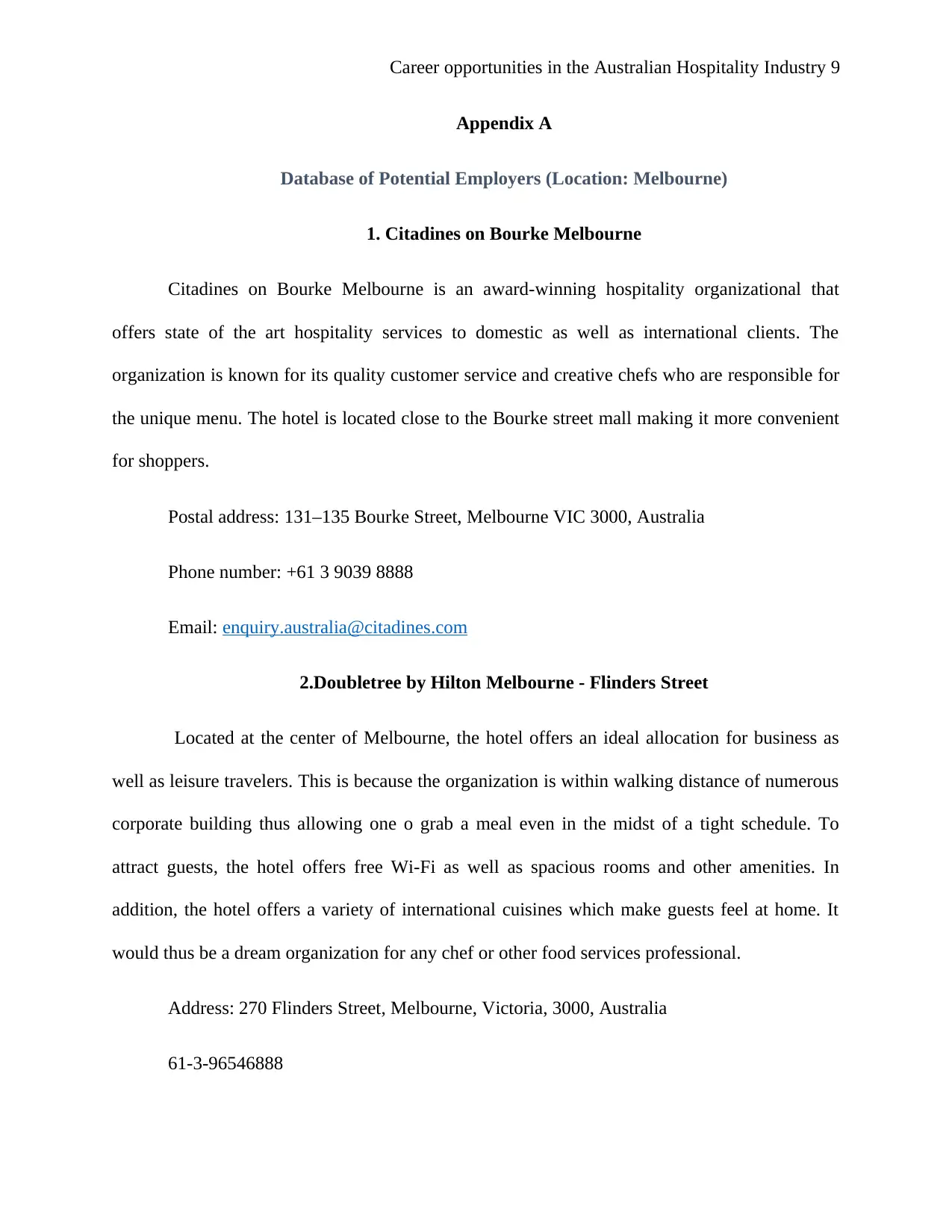
Career opportunities in the Australian Hospitality Industry 9
Appendix A
Database of Potential Employers (Location: Melbourne)
1. Citadines on Bourke Melbourne
Citadines on Bourke Melbourne is an award-winning hospitality organizational that
offers state of the art hospitality services to domestic as well as international clients. The
organization is known for its quality customer service and creative chefs who are responsible for
the unique menu. The hotel is located close to the Bourke street mall making it more convenient
for shoppers.
Postal address: 131–135 Bourke Street, Melbourne VIC 3000, Australia
Phone number: +61 3 9039 8888
Email: enquiry.australia@citadines.com
2.Doubletree by Hilton Melbourne - Flinders Street
Located at the center of Melbourne, the hotel offers an ideal allocation for business as
well as leisure travelers. This is because the organization is within walking distance of numerous
corporate building thus allowing one o grab a meal even in the midst of a tight schedule. To
attract guests, the hotel offers free Wi-Fi as well as spacious rooms and other amenities. In
addition, the hotel offers a variety of international cuisines which make guests feel at home. It
would thus be a dream organization for any chef or other food services professional.
Address: 270 Flinders Street, Melbourne, Victoria, 3000, Australia
61-3-96546888
Appendix A
Database of Potential Employers (Location: Melbourne)
1. Citadines on Bourke Melbourne
Citadines on Bourke Melbourne is an award-winning hospitality organizational that
offers state of the art hospitality services to domestic as well as international clients. The
organization is known for its quality customer service and creative chefs who are responsible for
the unique menu. The hotel is located close to the Bourke street mall making it more convenient
for shoppers.
Postal address: 131–135 Bourke Street, Melbourne VIC 3000, Australia
Phone number: +61 3 9039 8888
Email: enquiry.australia@citadines.com
2.Doubletree by Hilton Melbourne - Flinders Street
Located at the center of Melbourne, the hotel offers an ideal allocation for business as
well as leisure travelers. This is because the organization is within walking distance of numerous
corporate building thus allowing one o grab a meal even in the midst of a tight schedule. To
attract guests, the hotel offers free Wi-Fi as well as spacious rooms and other amenities. In
addition, the hotel offers a variety of international cuisines which make guests feel at home. It
would thus be a dream organization for any chef or other food services professional.
Address: 270 Flinders Street, Melbourne, Victoria, 3000, Australia
61-3-96546888
⊘ This is a preview!⊘
Do you want full access?
Subscribe today to unlock all pages.

Trusted by 1+ million students worldwide
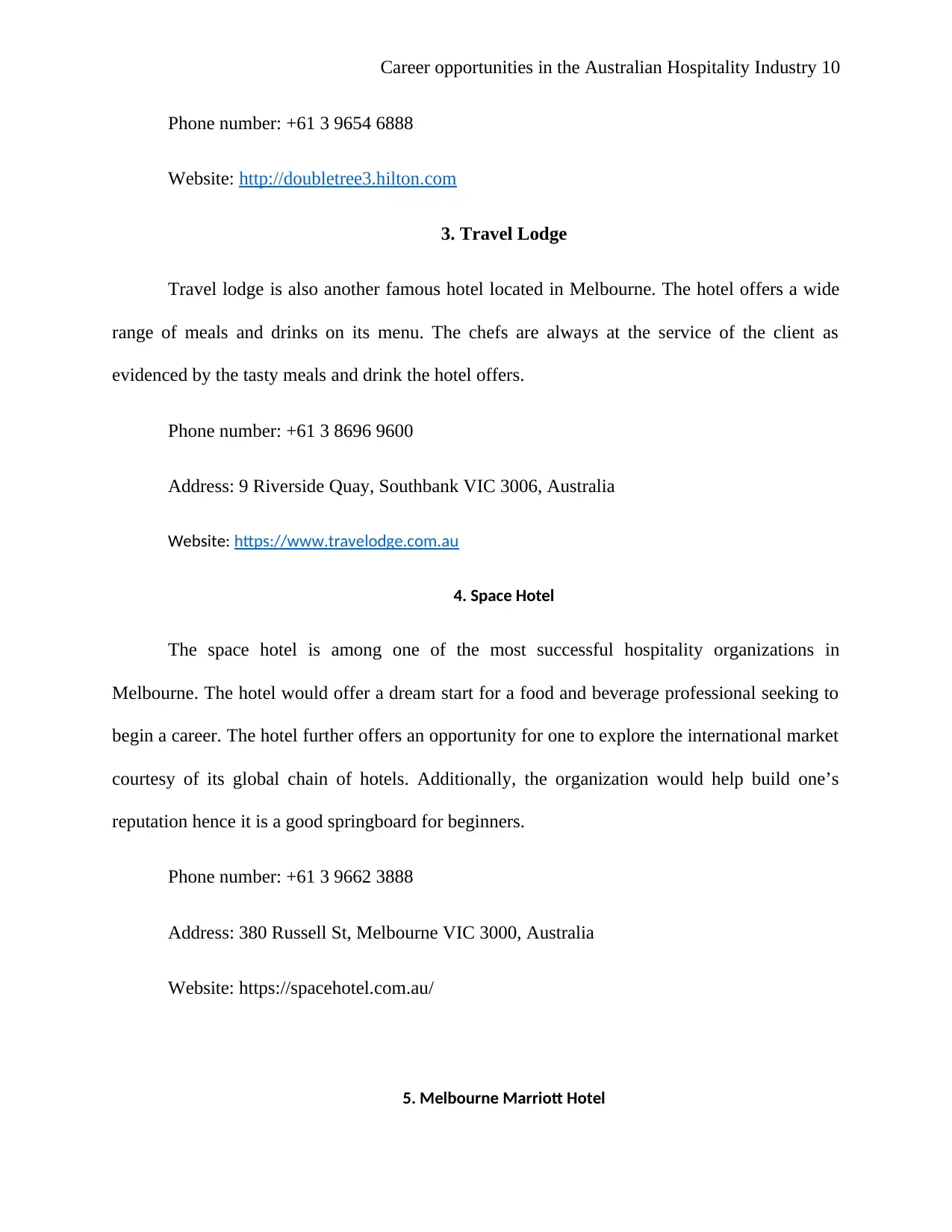
Career opportunities in the Australian Hospitality Industry 10
Phone number: +61 3 9654 6888
Website: http://doubletree3.hilton.com
3. Travel Lodge
Travel lodge is also another famous hotel located in Melbourne. The hotel offers a wide
range of meals and drinks on its menu. The chefs are always at the service of the client as
evidenced by the tasty meals and drink the hotel offers.
Phone number: +61 3 8696 9600
Address: 9 Riverside Quay, Southbank VIC 3006, Australia
Website: https://www.travelodge.com.au
4. Space Hotel
The space hotel is among one of the most successful hospitality organizations in
Melbourne. The hotel would offer a dream start for a food and beverage professional seeking to
begin a career. The hotel further offers an opportunity for one to explore the international market
courtesy of its global chain of hotels. Additionally, the organization would help build one’s
reputation hence it is a good springboard for beginners.
Phone number: +61 3 9662 3888
Address: 380 Russell St, Melbourne VIC 3000, Australia
Website: https://spacehotel.com.au/
5. Melbourne Marriott Hotel
Phone number: +61 3 9654 6888
Website: http://doubletree3.hilton.com
3. Travel Lodge
Travel lodge is also another famous hotel located in Melbourne. The hotel offers a wide
range of meals and drinks on its menu. The chefs are always at the service of the client as
evidenced by the tasty meals and drink the hotel offers.
Phone number: +61 3 8696 9600
Address: 9 Riverside Quay, Southbank VIC 3006, Australia
Website: https://www.travelodge.com.au
4. Space Hotel
The space hotel is among one of the most successful hospitality organizations in
Melbourne. The hotel would offer a dream start for a food and beverage professional seeking to
begin a career. The hotel further offers an opportunity for one to explore the international market
courtesy of its global chain of hotels. Additionally, the organization would help build one’s
reputation hence it is a good springboard for beginners.
Phone number: +61 3 9662 3888
Address: 380 Russell St, Melbourne VIC 3000, Australia
Website: https://spacehotel.com.au/
5. Melbourne Marriott Hotel
Paraphrase This Document
Need a fresh take? Get an instant paraphrase of this document with our AI Paraphraser
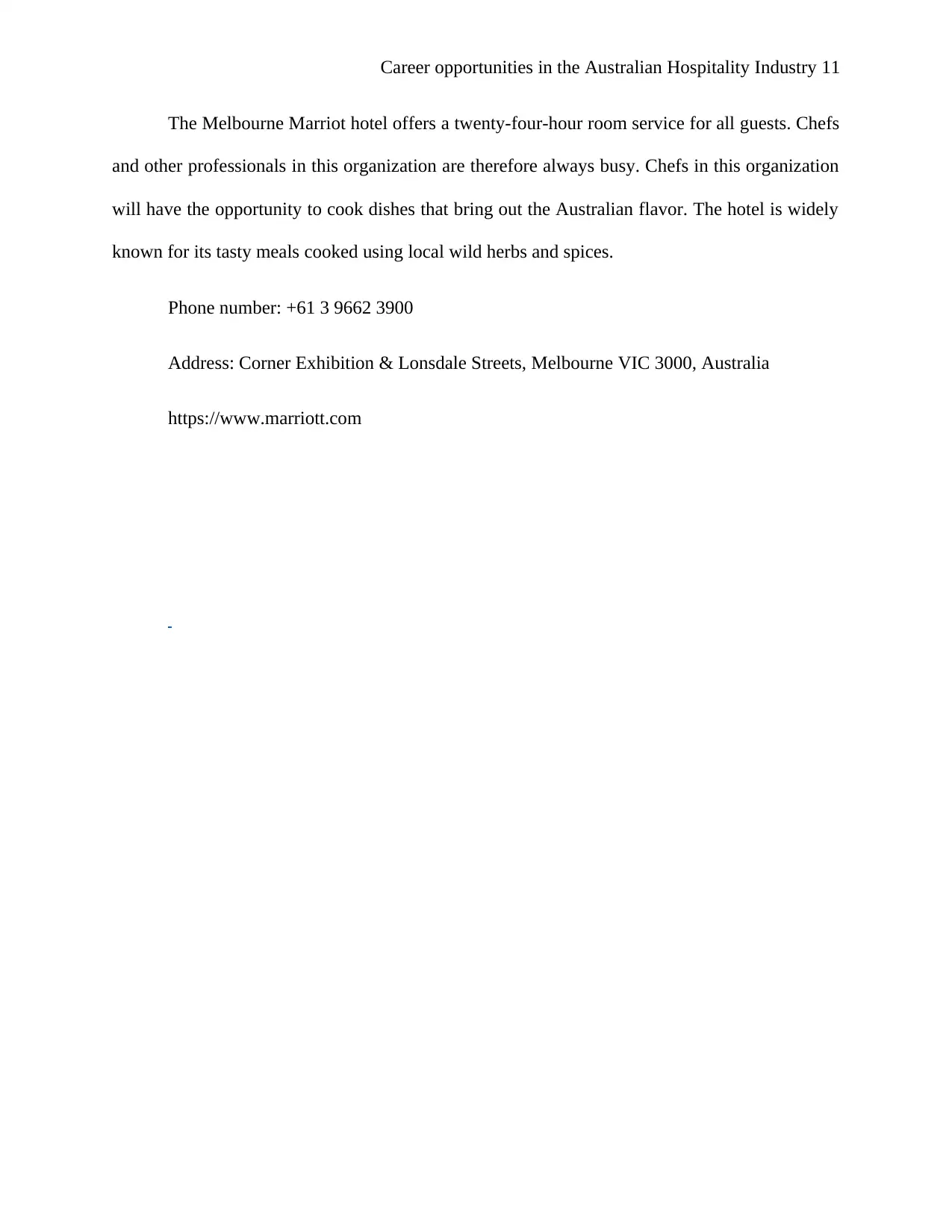
Career opportunities in the Australian Hospitality Industry 11
The Melbourne Marriot hotel offers a twenty-four-hour room service for all guests. Chefs
and other professionals in this organization are therefore always busy. Chefs in this organization
will have the opportunity to cook dishes that bring out the Australian flavor. The hotel is widely
known for its tasty meals cooked using local wild herbs and spices.
Phone number: +61 3 9662 3900
Address: Corner Exhibition & Lonsdale Streets, Melbourne VIC 3000, Australia
https://www.marriott.com
The Melbourne Marriot hotel offers a twenty-four-hour room service for all guests. Chefs
and other professionals in this organization are therefore always busy. Chefs in this organization
will have the opportunity to cook dishes that bring out the Australian flavor. The hotel is widely
known for its tasty meals cooked using local wild herbs and spices.
Phone number: +61 3 9662 3900
Address: Corner Exhibition & Lonsdale Streets, Melbourne VIC 3000, Australia
https://www.marriott.com
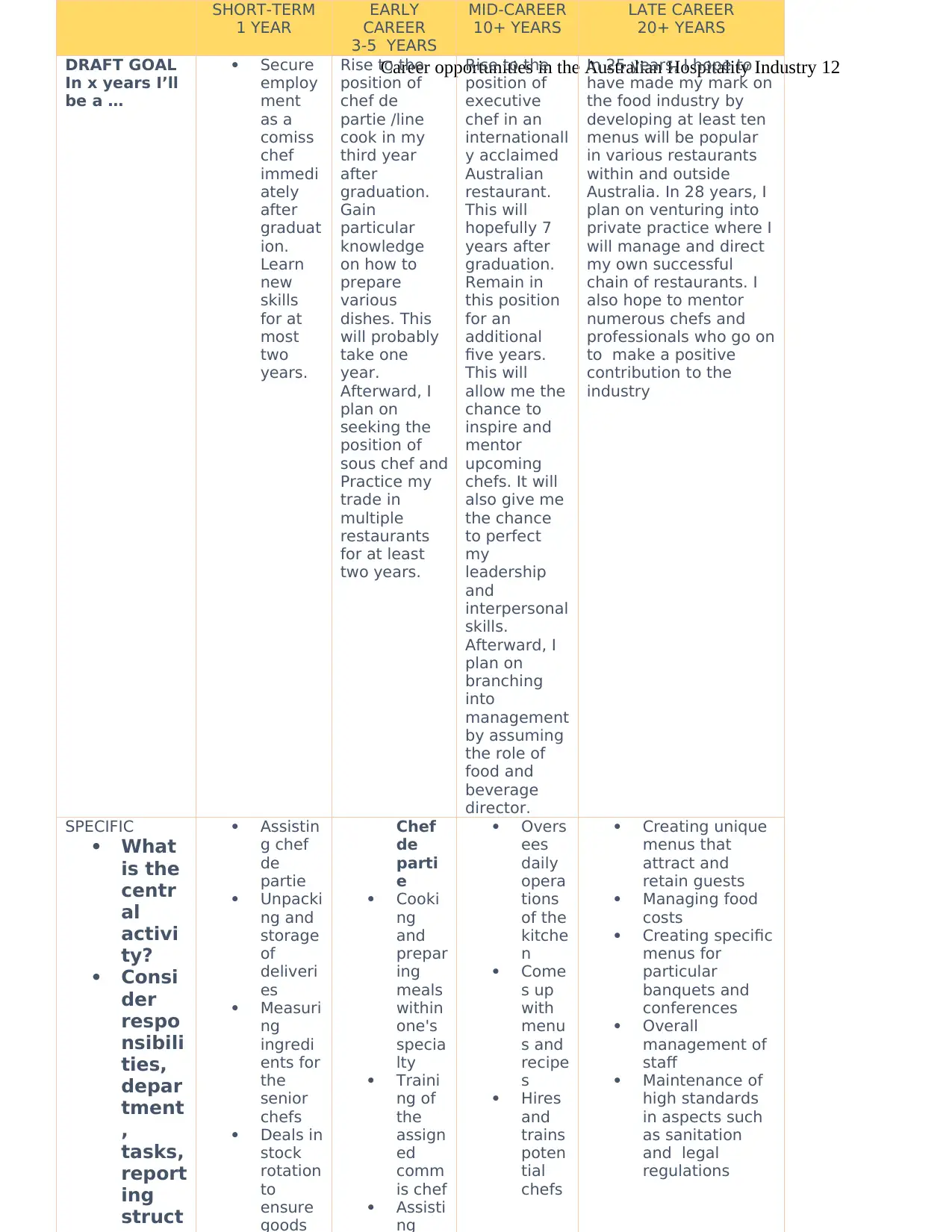
Career opportunities in the Australian Hospitality Industry 12
SHORT-TERM
1 YEAR
EARLY
CAREER
3-5 YEARS
MID-CAREER
10+ YEARS
LATE CAREER
20+ YEARS
DRAFT GOAL
In x years I’ll
be a …
Secure
employ
ment
as a
comiss
chef
immedi
ately
after
graduat
ion.
Learn
new
skills
for at
most
two
years.
Rise to the
position of
chef de
partie /line
cook in my
third year
after
graduation.
Gain
particular
knowledge
on how to
prepare
various
dishes. This
will probably
take one
year.
Afterward, I
plan on
seeking the
position of
sous chef and
Practice my
trade in
multiple
restaurants
for at least
two years.
Rise to the
position of
executive
chef in an
internationall
y acclaimed
Australian
restaurant.
This will
hopefully 7
years after
graduation.
Remain in
this position
for an
additional
five years.
This will
allow me the
chance to
inspire and
mentor
upcoming
chefs. It will
also give me
the chance
to perfect
my
leadership
and
interpersonal
skills.
Afterward, I
plan on
branching
into
management
by assuming
the role of
food and
beverage
director.
In 25 years, I hope to
have made my mark on
the food industry by
developing at least ten
menus will be popular
in various restaurants
within and outside
Australia. In 28 years, I
plan on venturing into
private practice where I
will manage and direct
my own successful
chain of restaurants. I
also hope to mentor
numerous chefs and
professionals who go on
to make a positive
contribution to the
industry
SPECIFIC
What
is the
centr
al
activi
ty?
Consi
der
respo
nsibili
ties,
depar
tment
,
tasks,
report
ing
struct
Assistin
g chef
de
partie
Unpacki
ng and
storage
of
deliveri
es
Measuri
ng
ingredi
ents for
the
senior
chefs
Deals in
stock
rotation
to
ensure
goods
Chef
de
parti
e
Cooki
ng
and
prepar
ing
meals
within
one's
specia
lty
Traini
ng of
the
assign
ed
comm
is chef
Assisti
ng
Overs
ees
daily
opera
tions
of the
kitche
n
Come
s up
with
menu
s and
recipe
s
Hires
and
trains
poten
tial
chefs
Creating unique
menus that
attract and
retain guests
Managing food
costs
Creating specific
menus for
particular
banquets and
conferences
Overall
management of
staff
Maintenance of
high standards
in aspects such
as sanitation
and legal
regulations
SHORT-TERM
1 YEAR
EARLY
CAREER
3-5 YEARS
MID-CAREER
10+ YEARS
LATE CAREER
20+ YEARS
DRAFT GOAL
In x years I’ll
be a …
Secure
employ
ment
as a
comiss
chef
immedi
ately
after
graduat
ion.
Learn
new
skills
for at
most
two
years.
Rise to the
position of
chef de
partie /line
cook in my
third year
after
graduation.
Gain
particular
knowledge
on how to
prepare
various
dishes. This
will probably
take one
year.
Afterward, I
plan on
seeking the
position of
sous chef and
Practice my
trade in
multiple
restaurants
for at least
two years.
Rise to the
position of
executive
chef in an
internationall
y acclaimed
Australian
restaurant.
This will
hopefully 7
years after
graduation.
Remain in
this position
for an
additional
five years.
This will
allow me the
chance to
inspire and
mentor
upcoming
chefs. It will
also give me
the chance
to perfect
my
leadership
and
interpersonal
skills.
Afterward, I
plan on
branching
into
management
by assuming
the role of
food and
beverage
director.
In 25 years, I hope to
have made my mark on
the food industry by
developing at least ten
menus will be popular
in various restaurants
within and outside
Australia. In 28 years, I
plan on venturing into
private practice where I
will manage and direct
my own successful
chain of restaurants. I
also hope to mentor
numerous chefs and
professionals who go on
to make a positive
contribution to the
industry
SPECIFIC
What
is the
centr
al
activi
ty?
Consi
der
respo
nsibili
ties,
depar
tment
,
tasks,
report
ing
struct
Assistin
g chef
de
partie
Unpacki
ng and
storage
of
deliveri
es
Measuri
ng
ingredi
ents for
the
senior
chefs
Deals in
stock
rotation
to
ensure
goods
Chef
de
parti
e
Cooki
ng
and
prepar
ing
meals
within
one's
specia
lty
Traini
ng of
the
assign
ed
comm
is chef
Assisti
ng
Overs
ees
daily
opera
tions
of the
kitche
n
Come
s up
with
menu
s and
recipe
s
Hires
and
trains
poten
tial
chefs
Creating unique
menus that
attract and
retain guests
Managing food
costs
Creating specific
menus for
particular
banquets and
conferences
Overall
management of
staff
Maintenance of
high standards
in aspects such
as sanitation
and legal
regulations
⊘ This is a preview!⊘
Do you want full access?
Subscribe today to unlock all pages.

Trusted by 1+ million students worldwide
1 out of 16
Related Documents
Your All-in-One AI-Powered Toolkit for Academic Success.
+13062052269
info@desklib.com
Available 24*7 on WhatsApp / Email
![[object Object]](/_next/static/media/star-bottom.7253800d.svg)
Unlock your academic potential
Copyright © 2020–2026 A2Z Services. All Rights Reserved. Developed and managed by ZUCOL.




